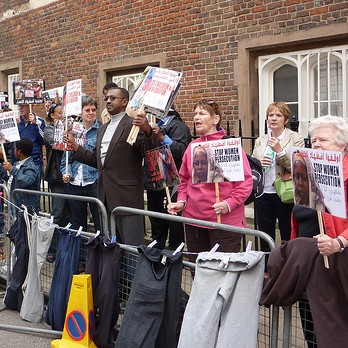 Sudanese media faces heavy government intervention: this year has already seen the arrest of more than 30 journalists and a popular newspaper prevented from printing five times, reports Abdelgadir Mohamed Abdelgadir
Sudanese media faces heavy government intervention: this year has already seen the arrest of more than 30 journalists and a popular newspaper prevented from printing five times, reports Abdelgadir Mohamed Abdelgadir
The Sudanese government halted publication of a popular Arabic daily, Ajrass Alhurria, in Khartoum this week. Officials from the National Intelligence and Security Services (NISS) ordered the printing press administration to stop handling all issues of the paper on Tuesday 21 June.
While the government did not explain why it had stopped publication, it could be because the newspaper routinely criticises the government and its policies, as well as the war and corruption in Abyie and South Kordofan. The editor in chief of Ajrass Alhurria has not received a response from government press affairs.
The newspaper has already been censored four times this year, twice in April and twice in June. The government’s latest action contravenes the free speech protections in the South Sudan Interim Constitution of 2005 and the International Covenant on Civil and Political Rights, which Sudan ratified in 1986.
Despite these legal protections, the right to freedom of expression in Sudan has always been fragile. Eight Sudanese journalists and writers are currently in prison for their work. One of them may face capital punishment. They all face vague charges for abusing the government’s reputation.
Among the eight imprisoned are Professor Omer Algarrai, a well known Sudanese writer and human rights activist and Mr Abdalla Alshiekh, the former editor in chief of Ajrass Alhurria.
Algarrai authored an article criticising three security officials who raped the Sudanese artist and civil activist, Safia Ishag, who was arrested earlier this year. A journalist from the Arabic daily, Al-akhbar, and a university lecturer, Faisal Mohamed Salih, is under trial with the same charges in the same court.
The government has found other tactics to deter journalists from publishing unsavory articles about the government. Amal Habani, a female journalist at the daily, Arabic Al jarida, was dismissed from her job under pressure from security officials and is also now charged with abusing the government’s reputation.
Finally, Jaffar Al- subki, a journalist at the Arabic daily, Al-sahafa, was arrested on 3 November 2010, and now charged with abusing the constitution and may receive the death penalty. Alsubki appeared in front of court today (21 June) with other eight activists in Khartoum central court, and the judge postponed the hearing to 12 July.
The abuse of Sudanese journalists continues. This year has seen the arrest of more than 30 journalists but how long does this list need to grow before something is done about it?
Image: Cathredfern on Flickr. London protests in support of Lubna Hussein, a Sudanese media worker and activist, who was prosecuted for wearing trousers in July 2009.
Abdelgadir Mohamed Abdelgadir is a freelance journalist and human rights defender





